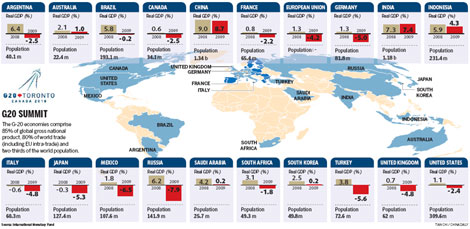Bizchina
A new beginning beckons global leaders
By Li Xing and Ding Qingfen (China Daily)
Updated: 2010-06-24 09:37
 |
Large Medium Small |
|
 |
|
Journalists working at the media center of the G20 summit in Toronto, Canada. [Xinhua] |
|
 |
|
Protestors walk up the street ahead of the G20 summit in Toronto on Tuesday. [Reuters] |
G20 summit to search for lasting measures to ensure 'strong, sustainable, balanced growth'
New York - The world needs a further concerted effort to ensure sustained global economic recovery and "a new beginning", as Canadian Prime Minister Stephen Harper spelled out in January, at the summit of the leaders of Group of 20 countries and organizations in Toronto this weekend.
But the G20 will be put to the test as diverse national views and interests have arisen and seem to be taking precedence over global issues. Thus, it will also test the political will and ability of the G20 as a group to play an even greater role in global economic and financial governance.
When the global financial crunch in 2008 signaled a global economic recession and the disruption of international trade, heads of state and government of G20 members convened in Washington DC in November 2008 to take concerted action.
The G20 includes 19 countries - Argentina, Australia, Brazil, Canada, China, France, Germany, India, Indonesia, Italy, Japan, Mexico, South Korea, Russia, Saudi Arabia, South Africa, Turkey, United Kingdom, and the United States, as well as the European Union. Collectively these economies account for more than 85 percent of global gross national product, more than 80 of world trade (including trade within the EU) and two-thirds of the world population.
Leading economists worldwide have so far commended G20 leaders for their efforts to act together with strong and timely stimulus measures and avoid the protectionism that led the stock market to crash in 1929 and plunged the world into the Great Depression.
"The alliance between advanced and emerging economies, through debate and mutual cooperation, has changed the way the world economy is governed," said Zhang Xiaojing, professor of economics and director of the macroeconomics department of the Institute of Economics at the Chinese Academy of Social Sciences (CASS). "The G7 or G8 no longer has an exclusive say over world affairs."
That the global response to the economic crisis "was successful has a lot to do with the shift to the G20, even though it is only an improvement, not perfection," Barry Bosworth, senior fellow of the Brookings Institute, told China Daily. "More countries were given more responsibility for global governance and acted in a responsible fashion. The outcome would not have been nearly as good if we stuck to the G7."
The G20 is important because it spoke out against trade restrictions and its effort to coordinate fiscal policy stimulus "worked very well", said Bosworth, an expert on fiscal and monetary policy, economic growth, capital formation and social security, and a former presidential adviser.
At the previous G20 summit in Pittsburgh, the assembled leaders promised that in Toronto they would place high on their agenda the implementation of commitments from previous G20 summits and work to come up with a "broad set of policy options to developing coordinated exit strategies" to help sustain a "strong, sustainable and balanced growth" in the world, according to the summit's website.
Meanwhile, the leaders would assess how far the countries have moved forward in implementing measures to strengthen financial regulatory systems and what they will recommend to further the reforms and ensure transparency in the marketplace.
They will also discuss ways to cut excessive risk taking and push for prudent behavior to help with long-term stability in development and financing.
Emerging economies will push for more concrete steps to get more say in and increased representation in international financial institutions, while enhancing their governance and strengthening their lending capacities in terms of providing crisis assistance.
Although all data in the first quarter of this year indicated that the world was heading for a strong recovery, subsequent uncertainties have aroused concerns that the world may fall back into recession.
The problems first emerged with the sovereign debt crisis in the eurozone. The crisis "has become a contagion that may spread globally", Zhang from CASS said.
The latest figures from the US and Japan are not encouraging either. While the high unemployment rate shows no sign of abating in the US, Japan is suffering from a high budget deficit and continued economic stagnation.
Nouriel Roubini, chairman of Roubini Global Economics and professor of economics at New York University, predicted that the US would only register 2 percent growth - a level that signals recession after the economy shrank in 2009.
Although May figures from China indicated there was a nearly 50 percent rise in its exports, the crisis in Europe is likely to lead to a fall in exports later this year.
Confronting all these problems, countries have adopted different contingency measures to cope, even though their measures are seen as either going against previous G20 communiqus or contrary to the best interest of the region or the world.
Global Trade Alert, which gathers information and studies from seven independent think-tanks, on Monday released its latest report, saying that major countries are continuing to take protectionist measures, despite the promise by G20 leaders to keep markets open.
The report found that nearly 650 protectionist measures have been implemented since the first crisis-related G20 summit in November 2008, where leaders promised to avoid taking such measures.
China's Ministry of Commerce has repeatedly said that the nation is a victim of trade protectionism. In a statement at the recent Doha round of negotiations in Japan, it said that further trade protectionism would derail the momentum of the global economic recovery.
Major exporting economies like Germany and Japan will also have to face accusations that they are responsible for the global economic imbalance. These countries will be asked to boost domestic consumption and spend more.
Meanwhile, China will be pressed to appreciate its currency, even though many economists, including Domenico Lombardi, president of the Oxford Institute for Economic Policy at Oxford University, argue that the "exchange rate is not the key to trade imbalances".
|
||||
However, the problem is that "we hear every country wants fiscal consolidation for itself and fiscal stimulus by others," said the senior fellow at the Brookings Institute.
Lombardi expressed concern that the worsening debt crisis in the eurozone would trigger more protectionist measures and tensions between exporting and importing countries would escalate.
Economists recommend that the leaders make the best use of the G20 platform to exchange ideas and focus on ways to sustain global economic growth.
Efforts should be made to avoid further tensions that could lead to a double-dip recession, Zhang added.




